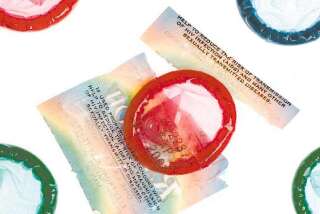VALENTINE’S DAY 1990: <i> A Story of Love in the San Gabriel Valley</i> : Claremont College Students Sending Safe-Sex Valentines
- Share via
CLAREMONT — Dozens of Claremont Colleges students sent each other medically approved Valentines this year:
“Condomgrams.”
The special-delivery prophylactics, tucked inside Valentine cards, had been offered for the last week at the campus dining halls as part of a safe-sex education project organized by student health groups.
The cost of sending one through the campus mail, to be delivered today, was 25 cents.
The “condomgram” promotion also coincided with National Collegiate Condom Week, a family planning and AIDS awareness program that began with the distribution of free condoms at UC Berkeley, in 1979.
“We’re trying to use humor to deal with a serious subject,” said Julia Karet, director of health education outreach for the six Claremont Colleges. “The message is that everybody is at risk and that college students need to protect their own generation.”
To help get that message across, students were also asked to participate in the colleges’ third annual Safer Sex Jingle Contest, which asks the question, “What do you say to a partner who is reluctant to use safer sex?”
Some of the winners last year included, “Practice a safe-sex tactic: use a prophylactic,” and “Condoms are the key to avoiding STDs (Sexually Transmitted Diseases).”
All that could be overshadowed, however, by a Condom Olympics that is scheduled at the colleges for later this year. Events might include a water-filled condom toss or a blow-up-the-condom-until-it-bursts contest, Karet said.
“We realize that there’s people who might be uncomfortable with taking a humorous approach to this very serious topic,” said Karet. “We also realize there’s a thin line between providing information about health care and doing something that could be interpreted as promoting sex--which is certainly not what we do.
“The idea,” she said, “is simply to promote safer sex.”
The safe-sex Valentine was the brainchild of the Student Health Advisory Committee and the Student AIDS Awareness Committee, both of which are composed of representatives of the five undergraduate colleges at the campus.
The 25-cent fee went to pay for the Valentine cards and to underwrite the cost of the condoms, which were purchased in bulk, Karet said.
Glow-in-the-dark condoms were also offered for $1, but are novelty items and students were warned not to use them as contraceptives or to prevent the transmission of disease, she said.
More to Read
Sign up for Essential California
The most important California stories and recommendations in your inbox every morning.
You may occasionally receive promotional content from the Los Angeles Times.










